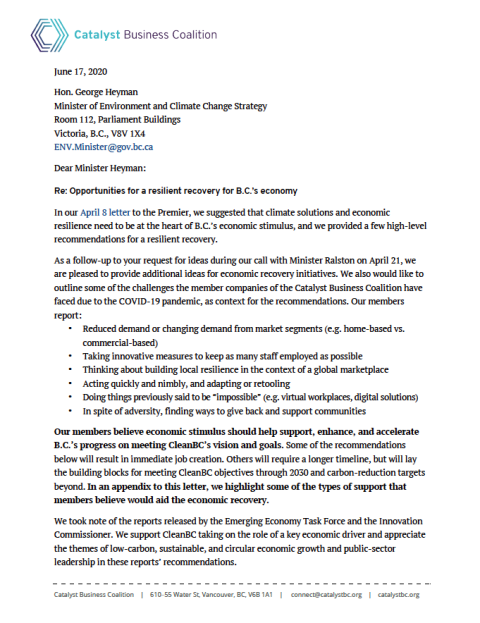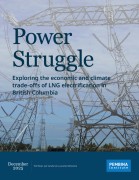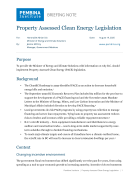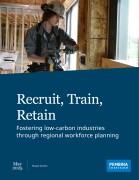The steering committee of the Catalyst Business Coalition sent the following letter to Minister of Environment and Climate Change Strategy George Heyman:
June 17, 2020
Hon. George Heyman
Minister of Environment and Climate Change Strategy
Room 112, Parliament Buildings
Victoria, B.C., V8V 1X4
ENV.Minister@gov.bc.ca
Dear Minister Heyman:
Re: Opportunities for a resilient recovery for B.C.’s economy
In our April 8 letter to the Premier, we suggested that climate solutions and economic resilience need to be at the heart of B.C.’s economic stimulus, and we provided a few high-level recommendations for a resilient recovery.
As a follow-up to your request for ideas during our call with Minister Ralston on April 21, we are pleased to provide additional ideas for economic recovery initiatives. We also would like to outline some of the challenges the member companies of the Catalyst Business Coalition have faced due to the COVID-19 pandemic, as context for the recommendations. Our members report:
- Reduced demand or changing demand from market segments (e.g. home-based vs. commercial-based)
- Taking innovative measures to keep as many staff employed as possible
- Thinking about building local resilience in the context of a global marketplace
- Acting quickly and nimbly, and adapting or retooling
- Doing things previously said to be “impossible” (e.g. virtual workplaces, digital solutions)
- In spite of adversity, finding ways to give back and support communities
Our members believe economic stimulus should help support, enhance, and accelerate B.C.’s progress on meeting CleanBC’s vision and goals. Some of the recommendations below will result in immediate job creation. Others will require a longer timeline, but will lay the building blocks for meeting CleanBC objectives through 2030 and carbon-reduction targets beyond. In an appendix to this letter, we highlight some of the types of support that members believe would aid the economic recovery.
We took note of the reports released by the Emerging Economy Task Force and the Innovation Commissioner. We support CleanBC taking on the role of a key economic driver and appreciate the themes of low-carbon, sustainable, and circular economic growth and public-sector leadership in these reports’ recommendations.
Climate adaptation
Expediting and expanding projects that build resiliency to flooding, wildfires, and other climate risks — or enhance the province’s capacity to mitigate and adapt to climate change and support ecosystem restoration — could provide much needed jobs across British Columbia during this time of uncertainty. For example, investments should be directed to flood and wildfire protection projects under the Ministry of Forests, Lands, Natural Resource Operations and Rural Development and Emergency Management BC. Enhancing and fast-tracking funding will enable municipalities and Indigenous and rural communities to be partners in implementing these projects. We look forward seeing B.C.’s climate preparedness and adaptation strategy, which is expected by the end of 2020.
Low-carbon homes and buildings
To curb carbon pollution from buildings by 80% by 2050, per B.C. legislation, we must retrofit on the order of 30,000 houses, 17,000 apartment units, and 3 million m2 of commercial space — across the province — every year between now and 2050. This “megaproject” could create more than 20,000 jobs province-wide and generate $10 billion in GDP growth.
Retrofits of government buildings have been prioritized under the CleanBC plan. Public buildings provide centrepieces in communities across the province for demonstrating leadership. Targeting schools, hospitals, and social housing offers the added benefits of improving occupant health and comfort in these buildings (e.g. improved ventilation, air conditioning, and filtration). Arenas and recreation centres, in particular, are among municipalities’ largest sources of emissions. Retrofits of these facilities, which could be completed within a couple of years, would provide significant reductions.
In the long run, leveraging limited public dollars to mobilize private capital will be critical to funding retrofits at the scale needed to achieve our climate targets. Property Assessed Clean Energy (PACE) is an innovative tool that could be employed to finance green-building and energy-efficiency projects.
For other innovative projects, the CleanBC Building Innovation (CBBI) Fund attracted $13.8 million in applications, and $1.8 million was awarded. Projects on the order of $12 million could be reconsidered if the fund is recapitalized.
Clean energy
As energy-intensive areas of B.C.’s economy rebound, electrification needs to be made an obvious business choice to meet the electrification targets set out in CleanBC. Establishing favourable rates and removing barriers (e.g. cost, timelines, and infrastructure) will incentivize electrification.
The targets set out in B.C.’s Low Carbon Fuel Standard (LCFS) and renewable natural gas (RNG) requirements together could achieve nearly one-third of the reductions laid out in CleanBC, making them among the highest-impact policies supporting B.C.’s 2030 carbon-reduction goals. B.C.’s clean fuel sector, which is growing rapidly, is poised to provide clean energy solutions. As an example of the enormous opportunities, natural gas currently has only 0.2% renewable content, and a 75-fold increase is needed to meet B.C.’s target of 15% renewable content. Meanwhile, to meet the target of 650 million litres of locally refined biofuels, B.C. needs to increase production to more than five times the 125 million litres currently refined locally.
A clear, long-term government commitment to these policies provides a powerful investment signal to companies. Further, ensuring that these policies pave the way for future deep decarbonization should be a priority. Low-interest loans and loans with higher risk tolerance could be important tools (e.g. Norway provides loans at a 5% interest rate; the U.S. Department of Energy provides loan guarantees and loans at reasonable rates).
There is support for reinvigorating and recapitalizing the Innovative Clean Energy (ICE) Fund to support clean fuel production and clean tech solutions. The application and reporting process for the fund is efficient, provides a necessary level of transparency and accountability, and has proven to be successful at backing winning projects. Government may need to amend the fund to enable larger grants for some projects. B.C. should work with its federal counterparts to ensure funding mechanisms (e.g. Canada Infrastructure Bank; EDC Canada Account for low-interest loans, bonds, and loan guarantees; and Strategic Innovation Fund for grants and repayable contributions) are complementary and will support B.C. initiatives.
To meet the ambitious RNG and LCFS targets, the biofuel and bioenergy supply chain needs to be diversified and expanded across B.C. Farms, mills, municipal waste facilities, and local refineries are already providing and producing low-carbon fuels, biofuels, and biomethane.
Many sawmills and pulp mills have closed across B.C. To sustain what remains, and possibly revitalize the forest sector, support is needed to diversify product mixes. There may be under-realized opportunities to retool the processing infrastructure throughout the province to produce biofuels, bioenergy, and even recycled pulp for paper products.
Growing the supply chain for biofuels and other end uses could provide further support to rural communities dependent on the agricultural and forest sectors. Reducing emissions from waste and creating a local, diversified, circular economy are additional benefits.
Our members have identified several shovel-ready/worthy renewable-energy projects: green hydrogen; fuels from atmospheric carbon dioxide; renewable gas projects (diversifying the feedstock for biorefining and developing biomethane from Fraser Valley farms, Vancouver Island pulp and sawmills, and Interior landfills); and marine-based pilot projects.
Clean transportation
Emissions from the transportation sector are challenging to tackle because the carbon footprint of passenger and freight movement consists of millions of point sources of pollution from cars, SUVs, buses, trains, heavy-duty trucks, ships, and planes.
Throughout the pandemic, we have seen growth in online shopping, resulting in an increase in urban freight volumes (akin to holiday season). Support could be provided to municipalities (or in collaboration with them) to expand alternative zero-emissions delivery modes (e.g. electric vehicles and cargo bikes) and support deployment of alternative delivery models and tech (e.g. off-peak deliveries, parcel lockers, and microhubs).
Insufficient data are collected and monitored by cities to plan for the future of goods movement. The B.C. government could provide support and collaborate with municipalities to better understand the scale of change in overall goods movement patterns and enable consistent municipal freight and goods movement strategies.
We would like to emphasize the importance of providing immediate funding to TransLink and BC Transit. Public transit remains an essential public good during the pandemic and will be essential to economic recovery. Emergency and long-term, stable funding for transit will ensure continuity of adequate and affordable transit service in B.C.’s municipalities, and that zero-emissions bus procurements and infrastructure are not postponed.
We have seen a notable increase in active transportation, such as walking and cycling, not only for recreation, but also for accessing basic needs. The health and climate benefits of this growth during the pandemic could be sustained through support and collaboration with local governments to grow active transportation infrastructure. We also recommend full implementation and funding of B.C.’s Active Transportation Strategy.
B.C. is home to many innovators that could supply zero-emissions solutions to the transportation sector. B.C. is home base for marine battery electric technology, carbon removal systems (from both point sources and atmospheric CO2), low-carbon fuels, and green hydrogen (many of these also have industrial applications), which could supply local North American markets and help meet global demand for such products.
To build on the momentum B.C. has supported in zero-emissions vehicles (ZEVs), we recommend incentives for the transition to ZEVs as a part of CleanBC continue to be funded and available (in particular, with additional incentives for lower-income households and for fleets that replace personal vehicle ownership). This, in turn, stimulates local employment in the installation of charging infrastructure across the province.
To reduce transportation emissions from agriculture, a fund could be established that provides capital support to local farmers, food processors, and other small and medium-sized businesses that are working to localize the food supply chain.This would support local food security, reduce food miles and transport emissions, and provide jobs and nutritional value. The government could provide seed capital and attract private and philanthropic sector investors.
Thank you for the opportunity to provide input. We would be pleased to share additional details for any of the above projects.
Yours sincerely,
Julia Balabanowicz
Co-chair, Catalyst Business Coalition
Director, government relations, Innergex Renewable Energy
Karen Tam Wu
Co-chair, Catalyst Business Coalition
B.C. director, Pembina Institute
Patrick Nangle
CEO, Modo Co-operative
Anna Stukas
Vice president, business development, Carbon Engineering
Greg Moy
Manager, government relations, Pacific, Insurance Bureau of Canada
Dan Walker
Social impact lead, Arc’teryx
cc:
Hon. Bruce Ralston, Minister of Energy, Mines and Petroleum Resources
Kevin Jardine, Deputy Minister, Ministry of Environment and Climate Change Strategy
Fazil Mihlar, Deputy Minister, Ministry of Energy, Mines and Petroleum Resources
Jeremy Hewitt, Assistant Deputy Minister, Ministry of Environment and Climate Change Strategy








